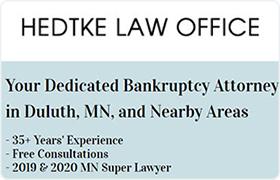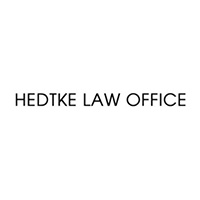 Eveleth Credit & Debt Lawyers, Minnesota
Eveleth Credit & Debt Lawyers, Minnesota
Sponsored Law Firm
-
 x
x

Click For More Info:
-
Hedtke Law Office
1217 E. 1St Street Duluth, MN 55805» view mapBankruptcy & Debt Sensible Debt Solutions
Hedtke Law Office is here to answer your questions and guide you through the bankruptcy process. We work to help you reduce your debt while keeping your personal property.
800-887-8940
Warning! No lawyers found in this specified area.
Not enough matches for Eveleth Credit & Debt lawyer.
Below are all Eveleth lawyers.
Lawyers
1-0 of 0 matches



 John Hedtke Duluth, MN
John Hedtke Duluth, MN Practice AreasExpertise
Practice AreasExpertise